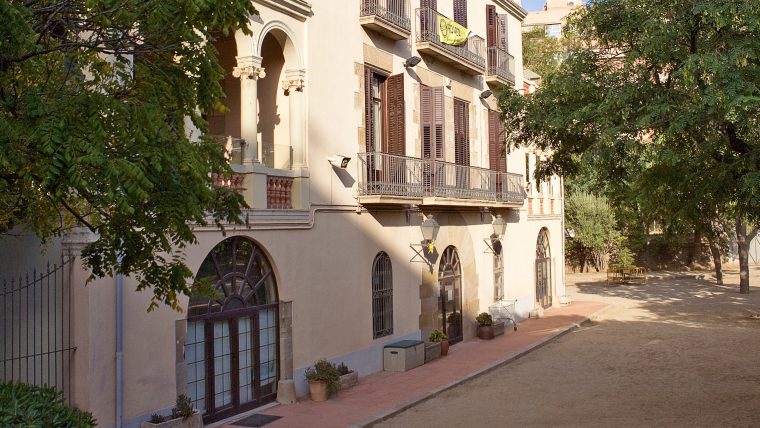meet.barcelona

Visit and love it
Les Carasses - Escola Ignasi Iglésias
Download date: 21/03/2025

This old, majestic farmhouse, dating back to the 17th century and renovated at the start of the 19th century, is currently the Escola Ignasi Iglésias, a municipal school.
-
Cultural heritage
Sant Andreu’s rural past
Listed as a Cultural Asset of Local Interest (BCIL) and an eloquent example of Sant Andreu de Palomar’s rural past, this three-storey farmhouse with a neoclassical facade was built between 1650 and 1651, at the height of the Guerra dels Segadors, or Reapers’ War. A 17th century manor house renovated in the early 19th century. The terracotta figures on the top of the main façade, which give the building its name, as well as the porticoed side galleries and the large balconies, come from the renovation work in 1825. In the garden we find a valuable ornamental fountain, work of Josep Puig i Cadafalch. It has recently recovered the shield with four bars that had been removed at the beginning of the Franco regime. The property was looked after by the Feliubadaló family from its origins to 1900. When they left the farmhouse, a canning factory moved in and used it until it was bought by the industrialist Valentí Iglesias.
From farmhouse to outdoor school
Les Carasses became a school during the Second Spanish Republic, in 1931. It was a coeducational school based on outdoor education and contact with nature. As it was surrounded by gardens and woods, and had an allotment at the back, classes were often held outside in the summer. It was named after the poet Ignasi Iglésias, who was born in Sant Andreu de Palomar.
 :
:
Location and contact
Location and contact

Les Carasses - Escola Ignasi Iglésias
- Address:
- Pg Torras i Bages, 108
- Districte:
- Sant Andreu
- Neighborhood:
- Sant Andreu
- City:
- Barcelona
Timetable and prices
Observacions
L'antiga masia senyorial de tres plantes del segle XVII fou modificada durant el primer quart del segle XIX per Jaume Oliveras, qui afegí els dos cossos laterals amb galeries cobertes amb terrat i la decoració de la façana primitiva i els balcons, amb les figures de terracota que donaven nom a l'edifici. L'interior i l'entorn han estat repetidament modificats des que el 1931 s'instal·là l'escola Ignasi Iglesias que encara l'ocupa.
Discover other related points of interest
-
Casa Bloc
Passeig de Torras i Bages 91
-
Artillery Barracks of Sant Andreu
Pg Torras i Bages 141
-
Rec Comtal - Molí de Sant Andreu
C Andana de l'Estació 22*24

